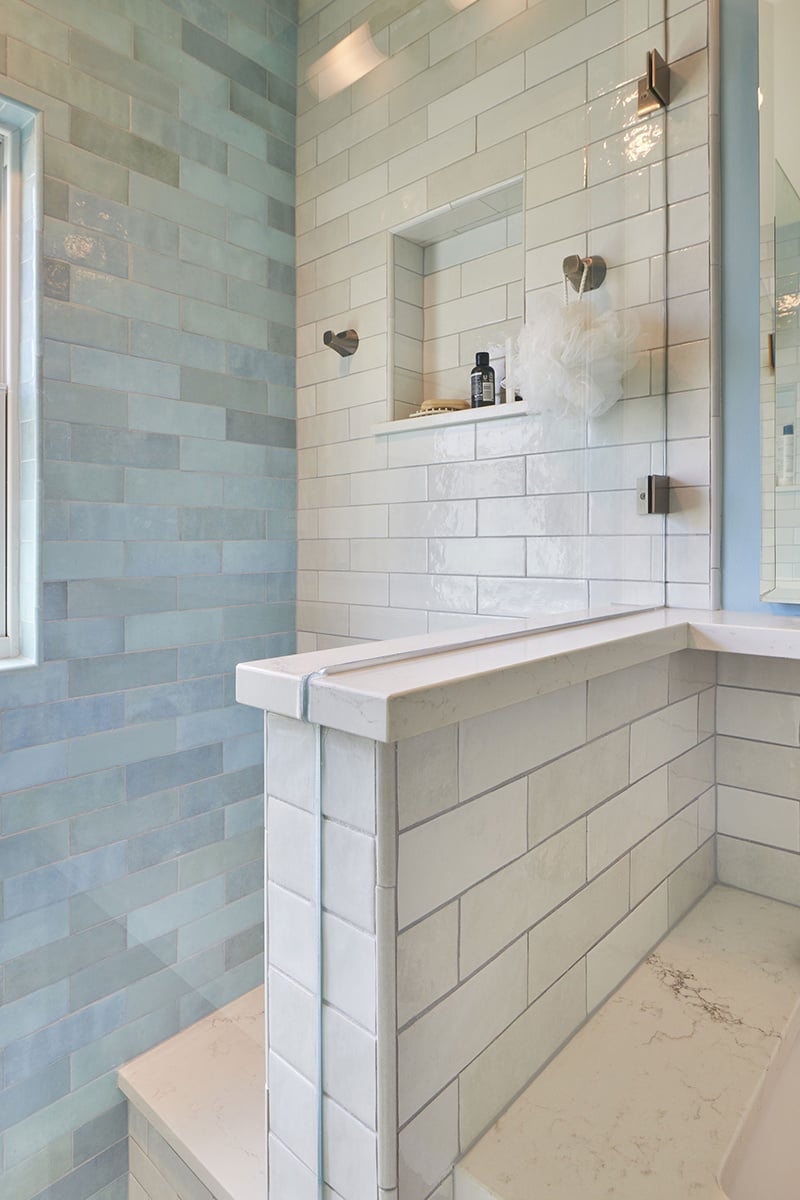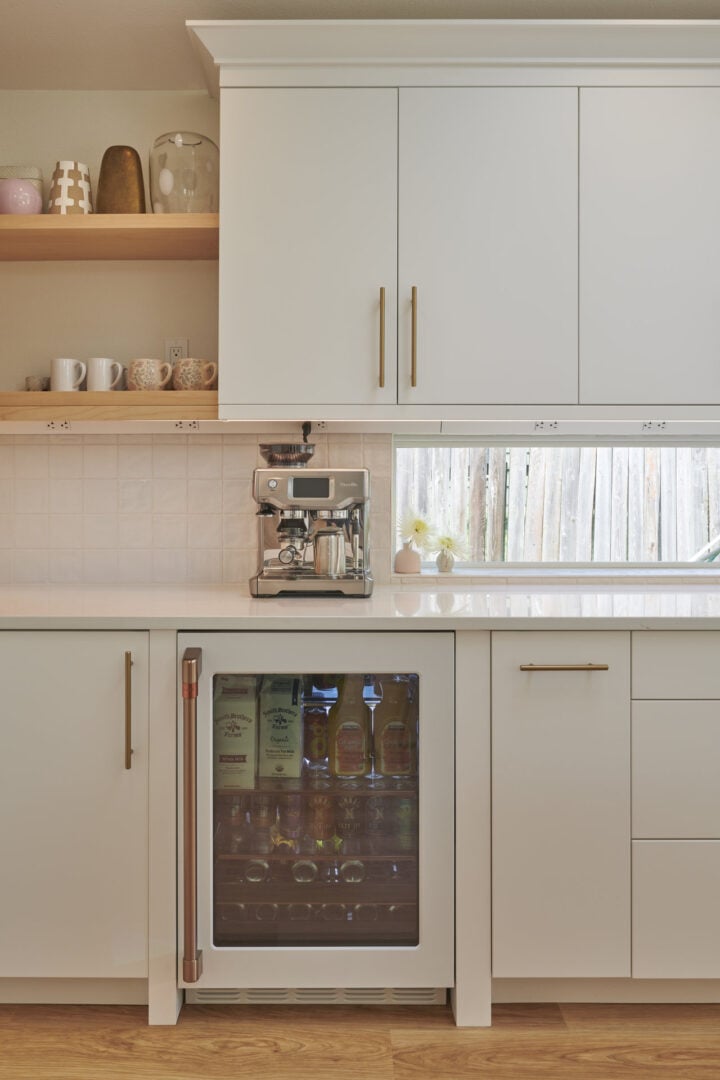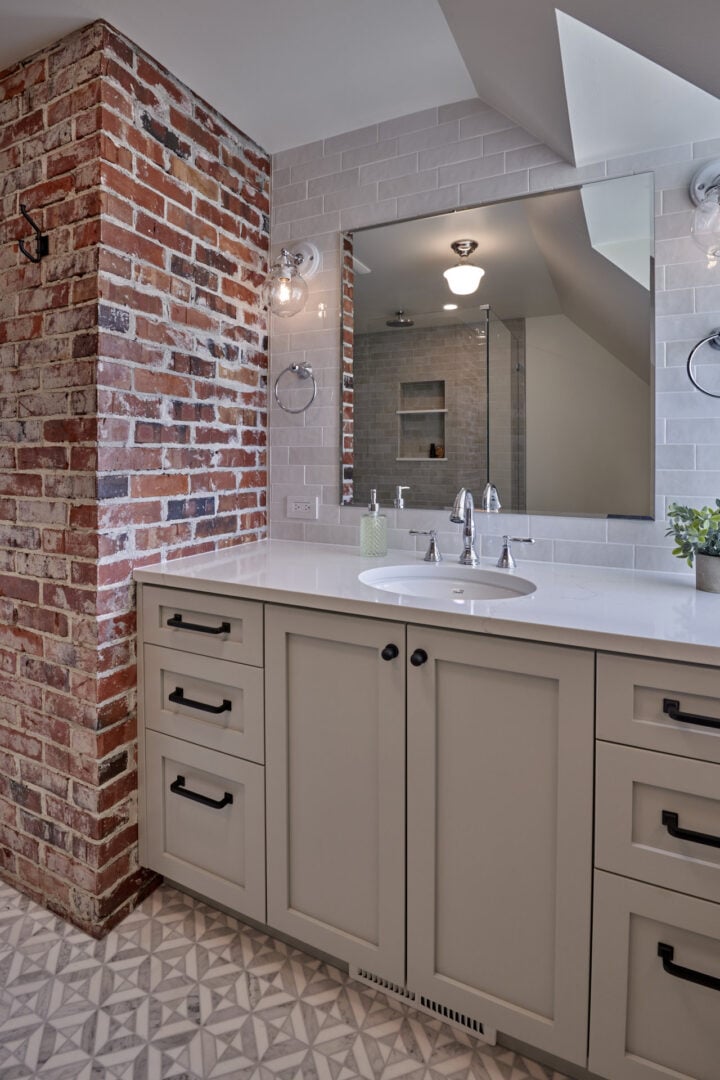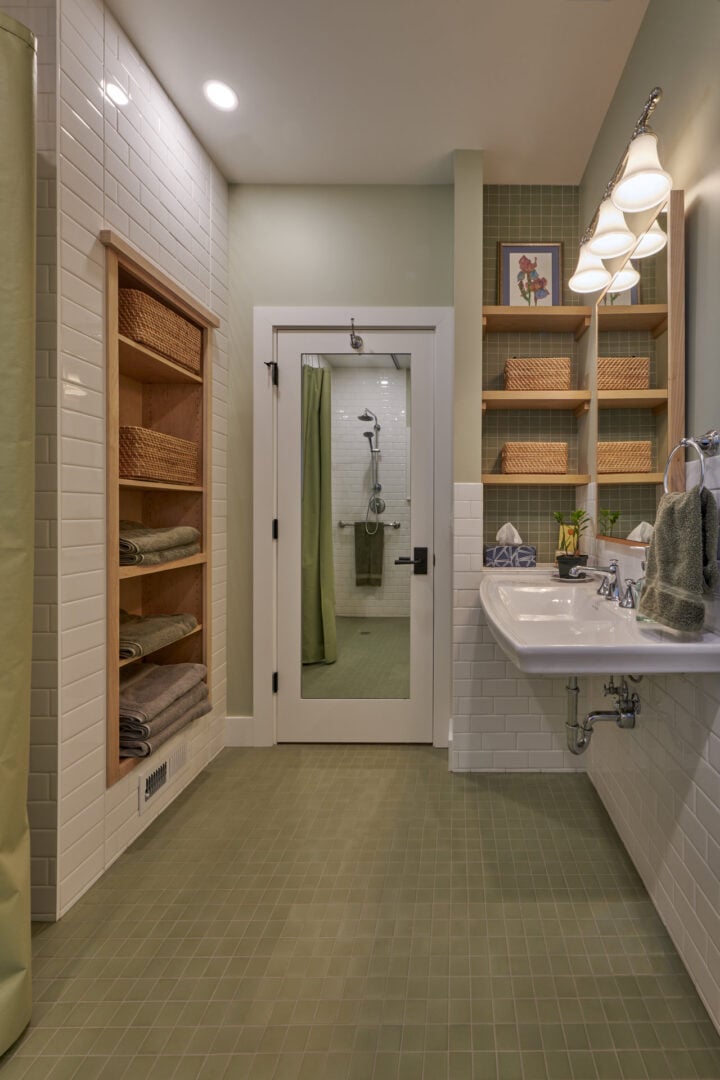Nearly all of our bathroom remodeling clients choose glass shower enclosures over shower curtains, which are prone to mildew and can get uncomfortably clingy when you’re in the shower. There’s no doubt that glass enclosures are a sleek, modern choice that many homeowners prefer. However, cleaning the shower glass can be a challenge due to the buildup of soap scum and mineral deposits. Keeping your glass showers sparkling doesn’t have to be a chore.
This blog post will cover the best techniques, tools, and tips to clean glass showers effectively and maintain their clarity. We’ll discuss various cleaning methods and products that will help you clean your shower glass walls and prevent the buildup of minerals or soap scum. Let’s get started!
Natural Cleaning Products for Glass Showers
Natural cleaning products are a great way to ensure that your glass shower door and glass shower enclosures remain clean. You may already have them around your home, and they are less expensive than commercial cleaners.
Using Baking Soda
Baking soda is excellent for removing soap residue from your glass shower easily. Just take one or two teaspoonfuls of baking soda and wipe it on the glass door using a damp cloth. Let the baking soda stay on the door for a couple of minutes. Rinse the solution from the door using warm water. If you have a detachable shower head, rinsing is easy. Otherwise, use a small bucket and splash the baking soda away. You can add a splash of lemon juice to your warm water.
Baking soda works especially well to remove soap residue, but it is less effective when used alone to remove hard water stains. We love that it’s a mild abrasive that’s natural and budget-friendly.
Vinegar for Hard Water Stains
You can mix equal parts of vinegar and water and put it in a spray bottle. Spray the glass shower door on both sides with the solution. Wait a couple of minutes and rinse it off with warm water. Then wipe the glass door with a dry white cloth or newspaper.
Vinegar is naturally acidic, so it works well to dissolve hard-water deposits and buildup on glass shower doors. However, used alone, it is less effective against soap residue.

The Power of Lemon Juice
Lemon juice is a natural option for cleaning shower glass while adding a fresh scent. The citric acid in lemon juice is very effective at dissolving minerals. You can squeeze several lemons to extract lemon juice or buy a bottle of lemon juice at the grocery store. Use straight lemon juice or dilute it (1:1) with water and put it in a spray bottle. Apply it to the glass door and wait a few minutes before wiping it off with a dry cloth. Alternatively, you can cut a lemon in half and just wipe it directly on the glass and then rinse.
Combined Cleaning Power
The above three items can be used in combination for an even deeper clean. Here’s how:
- Start with a natural acid: either distilled vinegar or lemon juice. Spray or wipe it on the shower door.
- Pour some baking soda into a small bowl. Add a little water to form a paste or dip in a wet scrubber or sponge.
- Vigorously scrub the baking soda paste onto the glass, which is still soaked in vinegar or lemon juice. You may notice some fizzing as the acid and base combine.
- Rinse the surface with plenty of clean water.
- For the best shine, follow up with a squeegee to remove the last traces of water and cleaner.
This video outlines the technique, which happens to be our favorite method:
Pros of using natural cleaning products
The main advantage of natural cleaning products is that they are relatively inexpensive. They are also readily available. Natural cleaning products tend to be gentler on your hands and shower surfaces, although even the mild acids in lemon and vinegar solutions can strip the coating on natural stone tile and grout. It’s best to apply these products directly to the glass and try to minimize contact with the rest of your shower. If you get any spillage on your tile, just rinse the acid away with water.
Cons of using natural cleaning products
Many professional cleaners swear by lemon juice, vinegar, and baking soda for shower door glass. However, these natural items may be less concentrated than their commercial counterparts. Thus, they may require extra scrubbing or may not work as quickly.
Non-Commercial Cleaners to Try
Other cleaning agents may be lying around your house. Here are a few that can be used to clean your glass door with varying levels of effectiveness:
Ammonia for Light Cleaning
Ammonia is a good cleaning agent for glass because it evaporates quickly and tends not to leave heavy streaks. I mention it here only because it’s the go-to chemical when many people think of cleaning glass, but it does have drawbacks. It performs admirably on relatively clean shower doors.To use ammonia for cleaning, mix it with warm water and spray it onto the door. Wait five to ten minutes before rinsing it and wiping it off with a dry cloth. But note that ammonia works best on greasy or oil-based stains, not lime scale. Furthermore, it produces dangerous fumes, so avoid it unless you have adequate ventilation. In short, there are more effective, safer cleaners out there.
Vodka
You can use vodka in combination with other materials such as peppermint oil. Mix a few drops of your favorite essential oil with half a glass of vodka. Spray it onto the glass door and wait a few minutes before rinsing it off. Like ammonia, vodka’s main benefits are its solvent properties and a streak-free shine, due to quick evaporation. Don’t expect it to dissolve heavy lime buildup, though.
Hydrogen Peroxide Mixture
You can use vodka in combination with other materials such as peppermint oil. Mix a few drops of your favorite essential oil with half a glass of vodka. Spray it onto the glass door and wait a few minutes before rinsing it off. Like ammonia, vodka’s main benefits are its solvent properties and a streak-free shine, due to quick evaporation. Don’t expect it to dissolve heavy lime buildup, though.
Tea Tree Oil and Other Essential Oils
This is an ingredient that can be used to clean your shower door or mixed into other cleaners. For instance, you can mix it with hydrogen peroxide and peppermint. This forms a great cleaning agent that isn’t effective against hard-water stains but is capable of getting rid of mold. After spraying, wait for about 30 to 60 minutes and then rinse it off.
Pros of Using Non-Commercial Cleaners
The primary benefit of the cleaning products above is that they are readily available. You probably have at least one of them in your home. These cleaning agents are also cheaper than commercial cleaners.
Cons of Using Non-Commercial Cleaners
Some of these items contain chemicals that may react with your hands or skin when you are cleaning or, in the case of ammonia, harm your lungs if not properly ventilated. Cleaning agents found at home may also be ineffective if you have hard water buildup in your shower.

Bets Commercial Cleaners for Shower Glass
Commercial cleaners are the best option if you have very hard water or severe mineral buildup. Some of the commercial products you can use to clean your glass shower door and enclosures include:
Scrubbing Bubbles
Of all the commercial cleaners, this one is my favorite for tackling both soap scum and hard-ware deposits, leaving a streak-free finish. This is a commercial product specifically designed to clean glass shower doors and enclosures. The cleaner comes in either an aerosol can or a pump-style spray bottle. Spray your glass door with the cleaner and let it foam up. Wait a few minutes and then rinse it off completely. For the heaviest soap or mineral build-up, you will have to do some manual scrubbing, too.
Trinova Shower Cleaner
This is a commercial cleaner that’s effective against soap and mineral buildup. Spray it on the shower door, scrub, and rinse. Finally, wipe down with a clean cloth. This product is effective but expensive compared to others on our list, ringing in at over $10 a bottle.
Lime-A-Way for Mineral Deposits
This cleaner is formulated specifically for hard-water build-up. It contains a mild acid, which dissolves hard-water deposits. It also has cleansers to dissolve soap residue, making it a must-have for clean glass showers.
Lemi Shine Original
Lemi Shine is most commonly used as a dishwasher additive for people with hard water. This naturally derived cleaner does a good job combating mineral buildup, so it’s also a good choice for hard water spots on glass shower doors. Lemi Shine does make a shower cleaning solution, which is less acidic, but for full-strength cleaning power, mix 1/4 cup Lemi Shine Original powder with 16 ounces of hot water and put it in a spray bottle. Spray it liberally onto your shower glass and wipe off with a clean cloth. Just avoid getting it on your tile because the acid could dull the finish.
Pros of using commercial cleaners for glass shower doors
Commercial cleaners can easily be found at your local grocery or hardware store. The advantage of commercial cleaners is that they are very effective at removing soap scum, and some are also good at removing calcium deposits. They also come in a variety of fragrances, if you like that sort of thing. (I don’t.)
Cons of using commercial cleaners for glass shower doors
One of the cons of commercial cleaners is that they are expensive. Commercial cleaners also contain various chemicals that may hurt other surfaces in your shower. If you decide to use them, wear gloves to protect your hands, and be sure you have plenty of ventilation.
Our Choice in Shower-Cleaning Products
I am a big proponent of keeping it simple and safe. For that reason, I would start with the natural cleaning products outlined above. Combining the lightly acidic mineral-dissolving power of vinegar or lemon juice with the mildly abrasive power of baking soda paste will leave 99% of dirty shower glass enclosures sparkling clean.
If you try the natural approach, and it doesn’t work for you, then I would advise you to do a deep clean. If your main issue is soap residue, try Scrubbing Bubbles. If hard-water stains are the problem, try Lemi Shine. When you’ve returned your shower glass to its original sparkling beauty, it’s important to take steps to avoid heavy build-up in the future. (See the Daily Maintenance section below.)
Use the Proper Tools
When it comes to cleaning shower glass, you need more than just cleaning solutions. Having the right tools on hand is an important part of your interior maintenance plan. Here are our favorite tools and accessories to get the job done.
- Non-abrasive sponge: Choose an ordinary soft foam sponge or one that has the lightest abrasive surface (usually white or pink). You will use this for loosening soap and mineral deposits and spreading cleaner on the surface.
- Squeegee: For a truly streak-free shine, you will need to remove almost all of the water you used to rinse. That’s because even softened water has trace minerals and impurities, which can leave streaks. Also keep your squeegee handy to give your shower a quick wipe-down each time you bathe.
- Electric drill brush attachment: For the heaviest mineral buildup, you may need to supplement your elbow grease with a little electric power. A simple brush-head for your cordless drill can turn ten minutes of heavy scrubbing work into a minute or two. Just be sure to pick a very soft brush, so as not to scratch the glass, and never use a drill that plugs into a wall outlet if you’re working in a wet environment like the shower. (Duh!)
- Clean cloths: Have a good supply of clean, lint-free cloths to wipe up the final water droplets when you clean. You can buy commercial rags, but you can also use old white tee shirts or cut up old towels.
- Small bucket: If your shower head can’t reach to every corner of your enclosure glass, you will need a small bucket to splash rinse water. An empty quart-size yogurt container will do in a pinch.

Daily Maintenance Tips for Sparkling Glass Showers
Cleaning a dirty glass shower enclosure isn’t much fun, even if you use the best methods. The best approach is to never let mineral and soap deposits build up in the first place. Here are two effective approaches to keeping your shower clean on a daily basis:
- Hang a squeegee in your shower and make it a habit to quickly wipe down the glass as soon as you turn off the water.
- Test the hardness of your water. If you have a high level of dissolved solids (not so much a problem in Seattle but a big issue in other areas and for homes serviced by wells), consider installing a water softener.
- Avoid using bar soap. Liquid body washes tend to leave less residue.
- Add a protective coating to your glass, like Rain-X, which helps prevent water droplets from forming.
- Spray your shower after each use with a no-rinse spray cleaner made for that purpose; it helps break down soap and prevents droplets from forming into hard water spots.
See also: Maintenance Checklist: Your Home’s Interior
Choosing the Right Shower Glass for Easy Cleaning
The types of glass used in shower doors are standard or ultra-clear. Standard glass doors often appear slightly green due to the presence of iron. Ultra-clear glass is low in iron, which gives it exceptional clarity. The only drawback, as you can imagine, is that ultra-clear glass is more expensive than standard glass. Still, if you are going to go to the trouble of keeping your shower enclosure squeaky-clean, it might be worth the splurge on glass that’s totally clear.
See also: 10 Durable Bathroom Materials
Bathroom Remodeling
Glass shower doors and enclosures are a great addition to your bathroom, but keeping them clean is key to maintaining their beauty. From natural solutions like vinegar and baking soda to powerful commercial cleaners, there are plenty of options to help you keep your glass spotless. Regular maintenance and the right tools make cleaning the shower glass much simpler.
If you’re considering a remodel of your bathroom, contact us and we’ll get the job done. Please don’t hesitate to get in touch with us today to discuss your ideas. We will be happy to help you plan the next steps.








